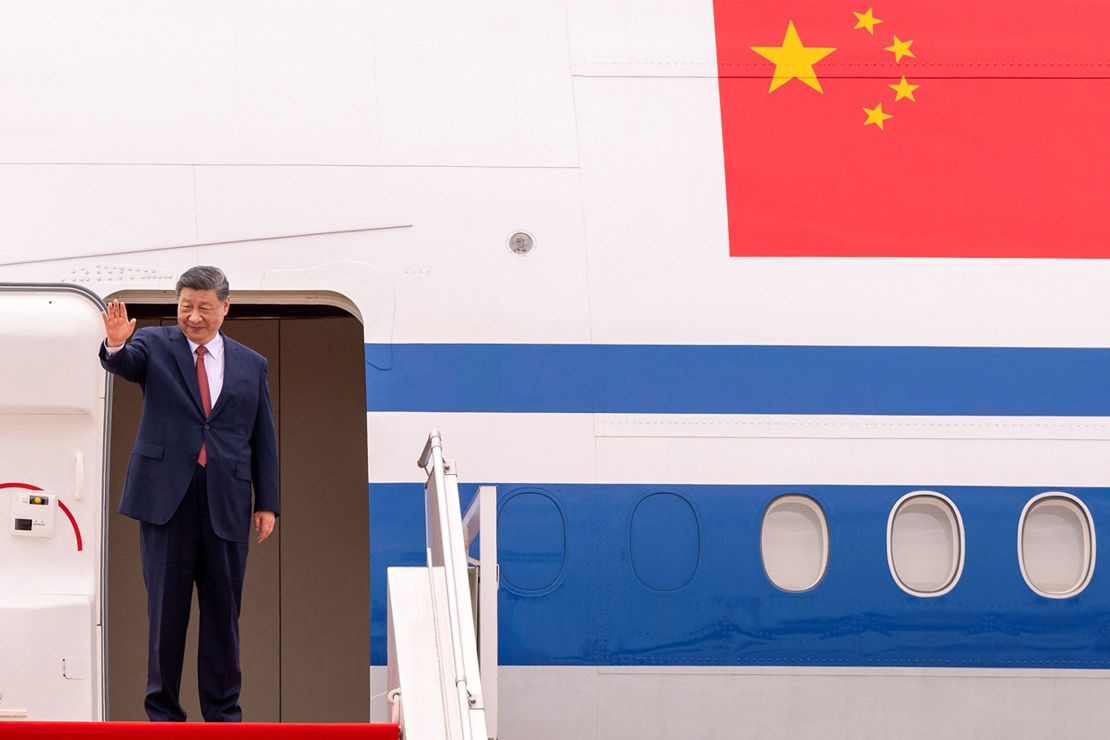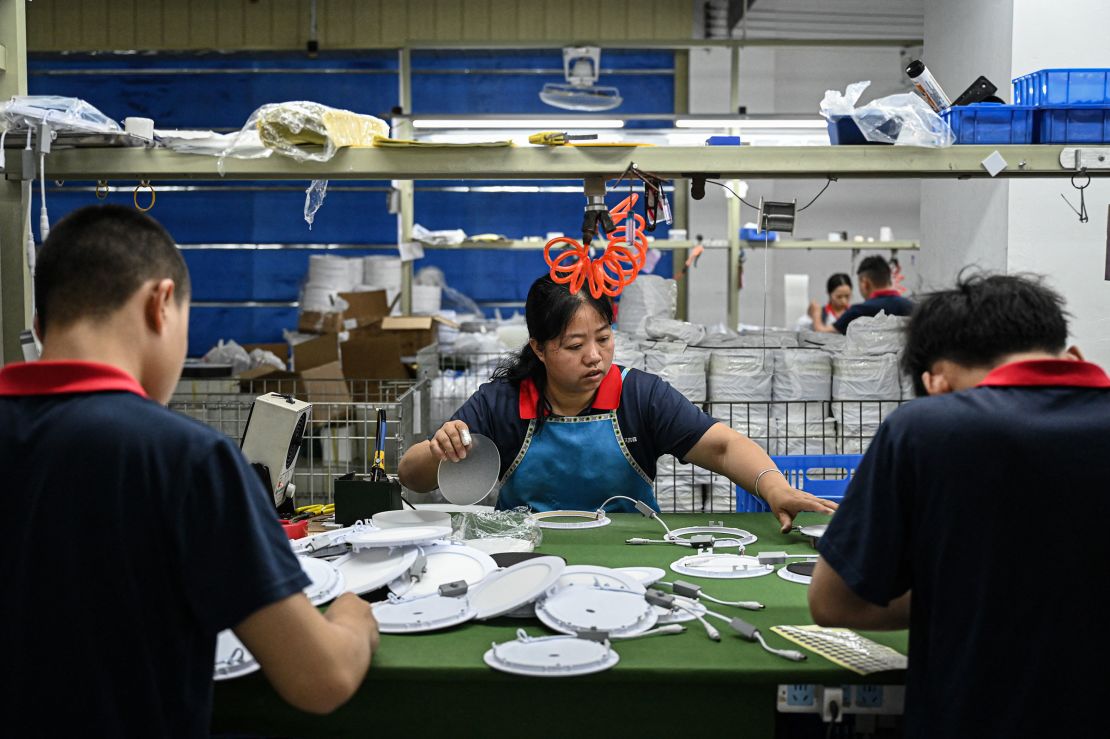Hong Kong
CNN
—
US President Donald Trump has delighted global investors with the possibility of a “substantial” reduction of China tariffs. But his signal to de-escalate America’s trade war with the world’s second-biggest economy has been greeted with suspicion and ridicule inside China, with online users deriding the mercurial leader as having “chickened out.”
On Tuesday, Trump told reporters at the Oval Office the astronomical tariffs on Chinese goods will “come down substantially.” He even promised to eschew hardball tactics, vowing to be “very nice” at the negotiating table and pledged not to mention the origins of the Covid-19 pandemic.
But those peace overtures have failed to elicit a positive response from Beijing. At least, not publicly.
Asked about Trump’s comments on Wednesday, a spokesperson for China’s Foreign Ministry appeared to shrug them off by citing a familiar official refrain: Beijing is willing to talk, but not when it’s being pressured or threatened by triple-digit tariffs.
Wang Yiwei, director of the Institute of International Affairs at Renmin University in Beijing, explained that, after weeks of posturing and contradictory messages, Chinese officials mistrust Trump. Moreover, he says, Beijing feels it now has the upper hand.
“The pressure at home is mounting, and much of his current messaging is aimed at appeasing domestic concerns,” he told CNN, pointing to a slump on Wall Street and concerns about inflation. “He’s getting a bit flustered now. But China doesn’t buy into his talk about (substantially lowering) tariffs. He says one thing today and another tomorrow, maybe increasing them again the next day. He’s not trustworthy.”
For months, Beijing has been projecting an air of strength. Last week, Chinese leader Xi Jinping toured three countries in Southeast Asia to bolster China’s position as a stable political and economic partner. However, the Chinese economy isn’t the juggernaut it once was, and some experts say Beijing will eventually have to negotiate.

Trump’s potential U-turn on China came a day after he met privately with chief executives of four major US retail companies — Walmart, Target, Home Depot and Lowe’s — who expressed concern about rising economic fallout from his tariff policy and the uncertainty it has created for financial markets.
Many major investment banks have predicted the massive tariffs, as well as China’s 125% retaliatory tariffs on US goods, would plunge the US and global economies into a recession.
On Wednesday, Trump told reporters that there were direct talks between US and Chinese officials “every day” on trade, though he didn’t want to be drawn out on the specifics.
And while the president hasn’t quantified what he means by a substantial tariff cut, a senior White House official separately told the Wall Street Journal that the current 145% tariffs on China could come down to “between roughly 50% and 65%.”
But Renmin University’s Wang, who is currently traveling in Washington and speaking to American analysts, said slashing tariffs to that level is not enough to get China to negotiate.
“If you really want to negotiate seriously with China, then you should cancel all those baseless tariffs first, and then come back to the table,” he said, adding that Trump is trying to “bait” Beijing into talks.
“If you call him now and show any sign of weakness, he’ll think his tactic is working—and double down,” he added.
Hardline response
The news that the Trump administration was considering slashing the levies was largely derided on Chinese social media, where it was the top trending topic on Weibo on Thursday morning.
“Our side says we don’t care about that!” one user wrote in a comment that garnered more than 1,000 likes. Another said: “If the so-called reciprocal tariffs aren’t even canceled— don’t bother negotiating with them!”
This commonly heard hardline position is an echo of China’s public responses. But despite Beijing’s official stance, some Chinese experts question the wisdom of a drawn-out showdown with Washington.

Speaking to CNN on condition of anonymity, a foreign policy expert in China said he was concerned about the impact of the sky-high tariffs on the country’s sluggish economy.
“Chinese authorities are not telling the truth. We’re being tortured by the grim economic decline,” they said. If the 145% tariffs remain in place, “our entire foreign trade landscape would be significantly impacted, resulting in massive job losses. Social unrest could increase, and the legitimacy of the government could be jeopardized,” they added.
Similar views expressed by Chinese experts, including criticism of Beijing’s move to impose tit-for-tat retaliatory tariffs on the US, are often censored on Chinese social media.
Hurting oneself
Earlier in April, a researcher at the Chinese Academy of Social Sciences, a top government think tank, posted on his personal WeChat social media feed calling China’s countermeasures “completely wrong.”
“The US raising tariffs is like lifting a rock only to drop it on its own foot — we shouldn’t do the same and hurt ourselves,” the researcher wrote in the post, the screenshot of which was censored after gaining traction online.
Last month, Beijing set an ambitious target of “around 5%” growth for this year, in a show of confidence in its export-driven economy. However, economists believe it will be tough to meet this target.
Analysts believe exports, which surged by 12.4% in March compared with the year before, will not be able to maintain that strong momentum in the coming months because of the American levies. Earlier this month, investment bank Goldman Sachs said the US tariffs will “significantly weigh” on the Chinese economy.
The expert who spoke to CNN anonymously believes China will come to the negotiation table in time.
“The Chinese side is posturing,” they said. “We must quickly reverse the trade war with the United States, but it’s all about saving face — pretending to be strong while waiting for the US to blink first. Then it can frame any compromise in the China-US negotiations as a Chinese victory and an American failure.”



